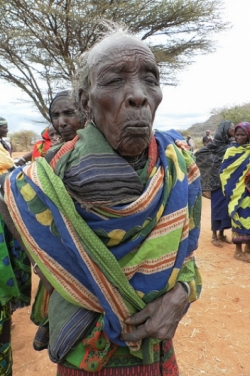 16 October is both World Food Day and Blog Action Day. As a result, the theme for Blog Action is food, but more specifically, the focus of World Food Day is “Food prices – from crisis to stability”.
16 October is both World Food Day and Blog Action Day. As a result, the theme for Blog Action is food, but more specifically, the focus of World Food Day is “Food prices – from crisis to stability”.
Our work has highlighted how much older people have been affected by the food crisis, price hikes and the devastating drought and famine in east Africa.
Older people key providers of food
At first, the situation seems contradictory: Older people are the key producers and providers of food, yet millions go hungry. They play a vital role in producing, preparing and providing food and high proportion of farmers in developing countries are older people.
In Jamaica for example, the average age of farmers is over 55. In Mozambique, more than two-thirds of the Small Farmers Union members are over 50.
However, there are many reasons why so many older people are going hungry. Reduced mobility can affect older people’s access to food. Land can also be a problem; as the need for farmland increases, older people can be victims of land grabbing. The declining capacity to farm, changes in the environment, as well as the demands of caring and insufficient income can also be huge issues for older people.
Food crisis and drought in Ethiopia
The crisis in Ethiopia has been a big focus of our work recently and is an example of many of the above reasons converging and leading to devastating results.
Ali, 74, a former pastoralist in Ethiopia said: “When there is no rain there is no water, so there is no pasture and our animals die. Because of the drought, most of my children are living far away, so getting enough food is very difficult. Sometimes I have to beg to survive and my neighbours help to cook food for me.”
The situation is similar for older people in Ethiopia living in urban settings. We surveyed 1,070 older people in Addis Ababa last year. 79% said they ate only once or twice a day. Since then food prices have surged 32.2% (according to the Ethiopian Central Statistical Agency, May 2011).
Grandparents in Ethiopia are the primary carers for 2.5 million children, but the food price hikes mean these grandparents now frequently have to choose between feeding themselves or their grandchildren. Invariably, they prioritise the children.
Cash grants only means of survival
Our work helping older people in Ethiopia has highlighted how vulnerable pastoralists have become due to the recent drought. Some villagers told us over 70% of the livestock they depend on for survival have been lost.
We have been giving older people cash grants so they can afford to eat. Many have said that the cash grants they have received from us are their only means of survival. Some are not physically able to come to the distributions so our partner, Action for Development delivers their cash at home.
Food insecurity is undoubtedly the main issue for older people in the areas of Ethiopia where we’re working. Another effect of a lack of food is that those receiving medicines cannot always take them, because they have to take pills with food.
Older people’s nutritional needs not met
Kurfa Alake Dibo, a 90 year old woman, came to collect her cash transfer. She is deaf and needs someone familiar to speak for her. She was accompanied by her son and although we couldn’t understand her completely, her gestures clearly said “I am hungry”.
In emergencies such as the drought in Ethiopia, older people’s nutritional needs are often unmet because they are not prioritised by humanitarian agencies. All the older people we work with unanimously agree that they have difficulty chewing and digesting the food available. Often it is maize, beans and wheat flour, with very small quantity of cooking oil and salt. It is not suitable or palatable for the majority of older people.
Solutions to global food crisis?
Alison Rusinow, HelpAge’s Country Director in Ethiopia, who has previously written a blog about food price hikes offers some solutions to the current crisis:
“The needs of older people and those they care for, must urgently be taken into consideration. The feeding and cash transfer programmes mentioned here are examples of projects that are essential but are more and more difficult to fund.
“Agricultural solutions are vital, changes to the way markets work are essential, the issues of land grabbing and the use of prime agricultural land to produce fuel for cars that are largely driven in developed countries all need attention.
“If the solutions to the global food crisis do not include ways to address the needs of the world’s most vulnerable groups, including older people, much of the progress made to improve food security and reduce poverty globally in the last 50 years will be undone and accompanied by the risk of increased insecurity, and more civil and international conflicts.”
Download a copy of Ageways 76: Food and nutrition
Register for Blog Action Day 2011 #BAD11, tag BAD11 Twitter posts with hashtag #bad11 or tweet directly @blogactionday11
Donate to our work helping older people affected by the food crisis
